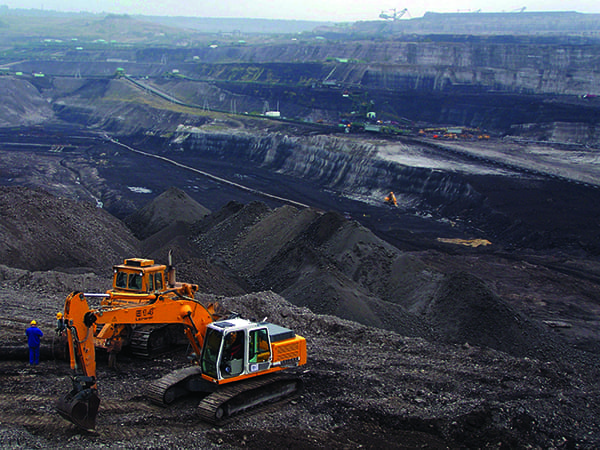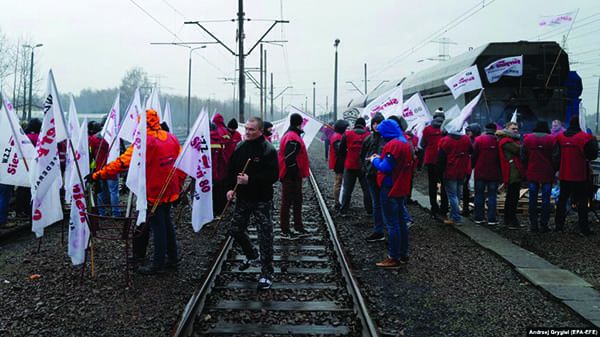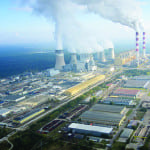Officials in Poland have said changing the fuel source of a planned 1-GW power plant in Ostroleka, known as Ostroleka C, from coal to natural gas could delay the project, which already faces several financial issues. Piotr Naimski, the country’s minister in charge of energy infrastructure, told Polish media in mid-February that “the issue of fuel for Ostroleka is being discussed and the final decision has not been made yet.”
Naimski has been considered a coal advocate. He added that the final decision is expected “soon,” but said there is a risk that a shift to gas could delay the project beyond its expected completion date of 2023. Naimski said construction of the plant in northeast Poland is underway—the plant was 5% complete at the end of January—but said its lead investors, state-run utilities Enea and Energa, have not secured full financing. Those companies in mid-February said they would suspend financing, perhaps in an effort to find outside support for the plant. Naimski said many banks have moved away from financing thermal generation plants for environmental and sustainability reasons. Ostroleka was touted as Poland’s last new coal-fired plant, but it has been criticized by environmentalists and analysts who have said it is not likely to be economic due to emissions regulations.
Under European Union (EU) emissions rules, Ostroleka C’s owners would need to pay dozens of euros per ton of carbon emitted. ClientEarth, a group of environmental lawyers, won two legal cases against Enea last year, and a Polish court in August 2019 ruled that the decision to proceed with the project had never been valid. Peter Barnett, a lawyer with ClientEarth, in a news release said, “All energy providers must think extraordinarily carefully about their future investment decisions. Regulation and market forces have rarely changed so fast and, as we’ve seen with Ostroleka C, companies cannot bank on finance for fossil fuels in today’s climate.”
A court in a separate decision in November 2019 asked Enea to produce documents that would explain how the plant would be profitable. Enea and Energa on Feb. 13 said that billions of zlotys (the Polish currency) in promised funding would be pulled from the plant due to changing market circumstances triggered by climate policy. The country’s biggest oil refiner, government-run PKN Orlen, in December 2019 announced plans to take over Energa and at the time officials said the company could replace coal with natural gas at Ostroleka C.
 |
|
1. The license to operate the Turow coal mine in Poland was scheduled to expire in 2020, though the state-controlled PGE Capital Group wants to extend the license until 2044. Most of the lignite from the mine is burned in the adjacent Turow power plant. Source: Creative Commons / Anna Uciechowska |
Poland’s gas grid operator Gaz-System has said connecting the plant to the country’s gas grid could take five years or more. Poland still generates most of its electricity from coal (Figure 1), and it is the only state in the EU that has not pledged to become carbon-neutral by 2050, saying it needs more time to develop other generation sources, including wind, solar, and even nuclear power.
 |
|
2. Polish coal miners block rail lines during February work stoppages. Miners were protesting coal imports from Russia, which they see as undercutting Poland’s domestic coal industry. Courtesy: Radio Free Europe |
Enea, meanwhile, and Gaz-System in February said they would work at connecting Enea’s coal-fired plant in Kozienice to the gas grid, with an eye toward converting the plant from coal to natural gas in the future. “This agreement shows that in its energy strategy Poland aims to replace exploited energy sources with modern ones, which improve our air quality,” Naimski said at a mid-February news conference. Government officials from the ruling Law and Justice party (PiS) have said they will continue to support coal, and have said coal will remain the country’s main energy source for several more years, although the government has taken steps to encourage investment in renewable energy. Polish coal miners, meanwhile, have staged strikes in recent weeks (Figure 2), saying the government should adopt a national energy strategy that ensures a future for coal.
Miners also have blocked rail lines bringing imported coal into the country. Miners at state-run PGG, the nation’s largest coal producer, also have demanded a 12% pay raise. PiS rose to power in 2015 partly on promises to sustain the country’s coal mining industry, and coal prices rebounded after the government closed some of the most uneconomic mines. Last year, though, the nation’s coal industry hit economic headwinds due to falling demand and increased imports of foreign coal. Enea and Energa, both with minority stakes in PGG, said their 2019 financial results were negatively impacted by problems at PGG, though the coal company does not disclose its finances. Analysts have said PiS will need to maintain its support from the coal industry ahead of the May 10 presidential election. PiS chairman Jaroslaw Kaczynski has said the party is supporting incumbent Andrzej Duda, who was elected in 2015.
—Darrell Proctor is associate editor for POWER (@DarrellProctor1, @POWERmagazine).










